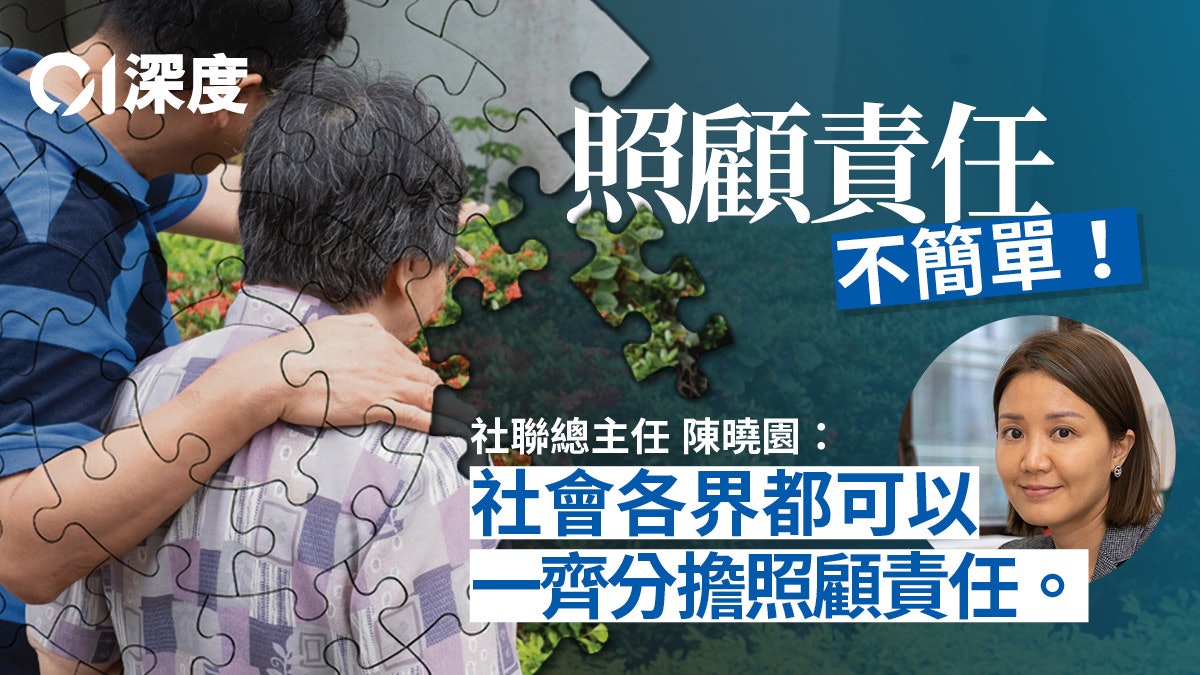Hong Kong has entered an aging society, and the need for care for the elderly, weak, sick and disabled is increasing day by day. You or I have the opportunity to be a caregiver.
However, who is the "caregiver"?
How many carers in need of support are there in Hong Kong?
Is the government prescribing the right medicine to ease the burden on caregivers?
How should society share the responsibility of care?
On Wednesday (November 30), the Legislative Council unanimously passed a non-binding motion on "Implementing a 'Carer-Oriented' Policy" proposed by DAB member Li Shirong, urging the government to provide more comprehensive support for caregivers.
Chen Xiaoyuan, Chief Service Development Officer (Family and Community) of the Hong Kong Council of Social Service, is happy to see the issue of caregivers gradually emerging, but believes that the policy still needs continuous improvement.
Legislative Council Members' Bill Policy Analysis Series
On October 28, the Hong Kong Council of Social Service presented the "Ideal Design of Carer Allowance" at the "Carer Support - Policy Initiatives and Service Development" seminar, advocating an increase in the amount of carer allowance to $3,945.
(profile picture)
Determine the "caregiver" to accurately implement "caregiver-oriented"
When discussing caregiver issues, the first question is how to define "caregiver" in order to prescribe the right medicine for the needs.
Broadly speaking, a carer is anyone who assumes caring responsibilities, whether paid or unpaid, professional or amateur.
As for the SAR government, it pays more attention to unpaid caregivers who take care of the elderly, the disabled, chronically ill or children with special learning difficulties, and provides them with direct and indirect community support services, including neighborhood centers, nursing centers, and respite centers, etc. .
However, society has different definitions of caregivers, and there are double counts in the estimated data, resulting in inaccurate allocation of support resources.
"Actually, some official figures are needed!" Chen Xiaoyuan, Chief Service Development Director (Family and Community) of the Hong Kong Council of Social Service, said in an interview with "Hong Kong 01" that she hopes the government will clearly define what a "caregiver" is, and then provide a lump sum and a unified In order to understand the economic capacity, physical condition, caring ability, etc. of different types of caregivers, as well as the needs of the care recipients, it is helpful to formulate policy measures or services that better meet the needs of caregivers.
According to the Census and Statistics Department's "2016 Population By-census Thematic Report: Elderly", there were more than 150,000 elderly people living alone in Hong Kong at that time, and nearly 300,000 elderly people only lived with their spouses, that is, every three elderly people One needs to take care of himself or "care for the elderly".
In Hong Kong, where the aging population is getting worse, the demand for care is bound to increase. The book "Adult Caregivers" published by senior independent journalist Chen Xiaolei this year mentioned that there are currently as many as 1.12 million caregivers in Hong Kong, including working and non-working caregivers. The number of care hours per week reached 44 and 88 hours respectively.
The burden on caregivers is heavy, and support measures are obviously in short supply. The Labor and Welfare Bureau announced this year and commissioned the Hong Kong Polytechnic University consultant team to conduct the "Major Report on the Consultancy Study on the Needs and Support of Hong Kong Elderly and Disabled Carers" and found that most of the current community support The main service targets of the measures are the elderly and the disabled who need to be cared for, and many caregivers interviewed said that it is difficult to benefit from it.
Li Shirong proposed to launch a "caregiver pass" to establish the status of caregivers in society.
(Screenshot of the YouTube segment of the Legislative Council of the Hong Kong Special Administrative Region)
Don't fall into poverty because of caring responsibilities
Li Shirong, a directly elected member of the New Territories Southeast Region of the DAB, pointed out in the wording of the motion "Implementing a 'Carer-Oriented' Policy" that many caregivers who are relatives lack professional nursing knowledge and need to sacrifice their job opportunities to take care of their families for a long time.
He urged the government to be "caregiver-oriented" and provide all-round support in economic, psychological, nursing knowledge and other aspects.
Lin Suwei, a member of the Legislative Council directly elected for the Southeast New Territories region who is a registered social worker, also pointed out that the policies for caregivers are fragmented and lack coordination, which cannot meet their real needs.
She suggested that the authorities actively promote the social culture of "caring for caregivers", and before formulating policies, a unified and clear definition of "caregivers" should be established, such as making good use of various assessment tools to rate caregivers and care recipients, and then respond to Their abilities and circumstances accommodate varying levels of support.
To strengthen support, the Government has implemented the "Pilot Scheme on Living Allowance for Carers from Low-income Families" and "Pilot Scheme on Living Allowance for Low-income Carers of Persons with Disabilities" through the Community Care Fund since 2014 and 2016.
However, the social welfare sector has always criticized the two with only 8,000 and 3,500 places respectively, which is a drop in the bucket compared to the over one million caregivers in Hong Kong. Moreover, the application threshold is too high, and there is an income test, and no other social security can be applied for.
Until this year, Chief Executive Lee Ka-chao just proposed in the "Policy Address 2022" that the above-mentioned subsidies should be normalized and the amount increased. For example, the monthly living allowance for caregivers of low-income families will increase by a quarter from 2,400 yuan to 3,000 yuan. Thousands of caregivers have benefited.
However, the Hong Kong Council of Social Service proposed at a seminar on "Carer Support – Policy Initiatives and Service Development" held on October 28 that the ideal carer allowance should be increased to $3,945.
Chen Xiaoyuan explained that the carer's allowance should be on par with the elderly's living allowance. Although the Social Welfare Department has assessed the basic living expenses of the elderly in the community through a series of assessments, elderly caregivers not only have to cope with their own lives, but also take care of others. The required expenses will inevitably increase. "For example, the caregiver needs to take a car, buy supplementary medical drugs, and food when he goes to the follow-up consultation with the elder. Therefore, he (the caregiver) cannot be calculated as a healthy person, but at least he should be regarded as an elder. Provide the most basic expenses of living in the community."
Chen Xiaoyuan, Chief Service Development Officer (Family and Community) of the Hong Kong Council of Social Service, said that she is happy to see that the issue of caregivers has gradually surfaced, but there is still room for improvement in policy.
(Photo by Zheng Zifeng)
Responsibility for care should no longer rest solely with carers
During the above-mentioned motion debate, Li Shirong proposed to change the caregiver's allowance to be paid by the "working family allowance" system, so as to facilitate the application of caregivers who are receiving old age living allowance and other public welfare funds, and benefit more people.
He also proposed to launch a "caregiver pass" similar to the elderly card. The pass can enjoy discounts on bus rides, supermarket shopping discounts, or even extend to caregiver medical vouchers, or combine technology to record medical records and facilitate follow-up consultations.
Lin Suwei suggested canceling the upper limit on the number of applicants for the caregiver's allowance, the income test and the inability to receive other subsidies, etc., to help caregivers meet their basic living needs.
The Federation of Social Welfare and various social welfare organizations propose to designate October as "Carers Month" this year. The theme of this year is "Peer Sharing". We hope that through a series of public education activities and seminars, we will promote the "community-oriented" concept of caring The importance of caregivers, and promote the community to walk with caregivers, share their caregiving burden and reduce their stress.
The above-mentioned PolyU research report also suggested that Hong Kong should formulate a "three-tier support model for caregivers", that is, redefine the roles of the government, the market, and the family, so as to enhance the capabilities of caregivers, encourage families and informal support, and promote services in a targeted manner. Integrated collaboration model.
Chen Xiaoyuan believes that as long as resources are activated, caregivers do not need to bear the responsibility of care alone, but can be shared by the government, communities, charities, commercial organizations and other sectors.
Taking the "Home Care for the Elderly" strategy advocated by the government as an example, she believes that if there is support from all walks of life, the policy is expected to achieve a win-win situation - on the one hand, the elderly can enjoy their old age in a familiar family and community, and on the other hand, they can avoid relying on community residential resources. But first of all, there must be comprehensive supporting measures to support them in practicing home aging.
Chen Xiaoyuan gave an example. There are many service organizations in the market that provide support services for caregivers, including respite services and caregiver training. They can build a support network for all caregivers, and share the care experience of those who have experienced it or the latest information on caregivers, which will help them Relieve stress and answer each other's questions.
The business community can also give caregivers affirmation and feedback. For example, companies can formulate special holidays and flexible work arrangements for caregivers.
Of course, the government has the duty to provide adequate living allowances to caregivers.
The Hong Kong Council of Social Service and various social welfare organizations propose to designate October as "Carers Month". This year's theme is "Sharing Together".
(event poster)









/cloudfront-eu-central-1.images.arcpublishing.com/prisa/KMEYMJKESBAZBE4MRBAM4TGHIQ.jpg)


